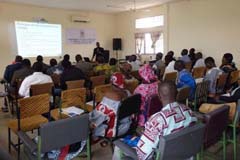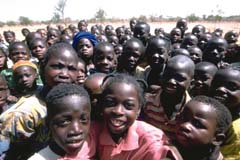Does School-Based Management Change School, Students, Teachers, and Community? Revealing the Quantitative Assessment Results
2016.05.26
School-based management (SBM) transfers authority in school management from the central government to schools and communities. In many cases a school management committee is established as the principal body for carrying out school activities. Since the 1990s, SBM has been adopted in many developing countries, and development institutions including the World Bank and JICA have supported these countries’ efforts. JICA started assisting SBM in Niger in 2004, and it subsequently expanded to Senegal, Burkina Faso, Mali, Cote d'Ivoire and Madagascar.
The "School for All” Project (or "Support to the Improvement of School Management through Community Participation") is a type of SBM project supported by JICA in West Africa. The JICA Research Institute (JICA-RI) conducted a research project "Impact Evaluation Analyses for the JICA Projects" to quantitatively verify the effects of projects. JICA-RI has recently published a series of papers out of the impact evaluation of the School for All project in Burkina Faso.

A training session is held to spread the "School for All" project
While the School for All project is accepted as an effective SBM model in West African countries, the evidence to prove the effectiveness of the model had not been sufficiently discussed. This research project is aiming at measuring the effectiveness of the model quantitatively to provide scientific evidence.
The research verified not only the educational outcomes — the rate of class repetition and the rates of attendance by students and teachers— but also social capital in communities. The research design deployed randomized controlled trials (RCTs), which randomly assign an evaluation sample to either a treatment group (which receives the project intervention) or a control group (which does not receive the intervention), and compare the outcome indicators of both after the intervention. Avoiding selection bias, this methodology can rigorously assess the impact of the project. This research was the first attempt at applying RCT on a JICA project.
The study randomly assigned about 280 elementary schools in Ganzourgou Province, Burkina Faso, to a treatment group or a control group. In the treatment group, members of a schools committee were elected by local residents and various activities were carried out by the committee and local residents to solve challenges a school was facing. In the research, an artificial field experiment known as a public goods game was also done to assess quantitatively such effects as the formation of social capital from the establishment of the school management committee and its activities.
The results of the assessment were as follows.
First, regarding the effects on educational outcomes, the intervention increased student enrollment, decreased student repetition (particularly male sixth-graders), and lowered teacher absence. This suggests that community participation can improve educational outcomes by empowering the community and enhancing social capital. (For details, see "Working Paper No. 112: How Can Community Participation Improve Educational Outcomes? Experimental Evidence from a School-Based Management Project in Burkina Faso.")
Next, regarding the effect on social capital, it was shown that the establishment of a School Management Committees (COGES) significantly increased social capital in the form of voluntary contributions to public goods. In particular, the average contribution was large in the groups composed of school principals, teachers and parents through the implementation of the COGES project and that there was an even larger effect from the democratic election of school management committee members. These results suggest that community management projects can improve local cost recovery by increasing local contributions of public goods, potentially leading to better fiscal sustainability in community-driven projects. (For details, see the "Working Paper No. 120: Election, Implementation, and Social Capital in School-Based Management: Evidence from a Randomized Field Experiment on the COGES Project in Burkina Faso.")
Also, as another method of assessing the effects on social capital, a connection between the SBM program's impacts and the development of Rotating Savings and Credit Associations (ROSCA) — local, informal, mutual financing monetary associations — was also verified. An analysis showed that relatively poor parents involved in SBM were more likely to participate in ROSCAs than other poor parents. (For details, see "Working Paper No. 115: Can School-Based Management Generate Community-Wide Impacts in Less Developed Countries? Evidence from Randomized Experiments in Burkina Faso.")

Burkinabe children (Photo: JICA/Kenshiro Imamura)
Those results were presented at the World Bank Headquarters in Washington, D.C., on March 14, 2016. The participants showed interest in the effects of the elections, improved teacher attendance and the fiscal sustainability of the intervention. The results were also shared at the Global Development Network's 17th Annual Global Development Conference in Lima, Peru, March 17-18, 2016, in the session "Education for Development" put on by JICA-RI, and participants showed great interest.
JICA-RI Senior Research Fellow Eiji Kokuza (currently with the JICA Human Development Department), said, "Based on the evidence acquired from the study, we, practitioners, should continue our efforts to improve the future projects. We can say that the project contributed to improving educational outcomes, but it is also necessary to pay attention to the heterogeneous impacts among grade levels and between boys and girls. These results may well reflect perceptions of parents who gave priority to higher grade levels over lower grade levels and to boys over girls when it comes to education. If that is the case, we must take into consideration lower grade levels and girls' education when we carry out the project in the future."
In addition, as a challenge in impact evaluation in education, he said that we should look at not only students’ test scores, repetition, and enrollment, but also the quality of lessons including teaching methods and students’ thinking. However, these data cannot be easily gathered, and we have to consider how to measure them for quantitative analysis.
JICA-RI will further work to enhance the nexus between JICA projects and academic findings. The impact evaluation is one way to serve that purpose.

事業事前評価表(地球規模課題対応国際科学技術協力(SATREPS)).国際協力機構 地球環境部 . 防災第一チーム. 1.案件名.国 名: フィリピン共和国.

事業事前評価表(地球規模課題対応国際科学技術協力(SATREPS)).国際協力機構 地球環境部 . 防災第一チーム. 1.案件名.国 名: フィリピン共和国.

事業事前評価表(地球規模課題対応国際科学技術協力(SATREPS)).国際協力機構 地球環境部 . 防災第一チーム. 1.案件名.国 名: フィリピン共和国.

事業事前評価表(地球規模課題対応国際科学技術協力(SATREPS)).国際協力機構 地球環境部 . 防災第一チーム. 1.案件名.国 名: フィリピン共和国.

事業事前評価表(地球規模課題対応国際科学技術協力(SATREPS)).国際協力機構 地球環境部 . 防災第一チーム. 1.案件名.国 名: フィリピン共和国.
scroll